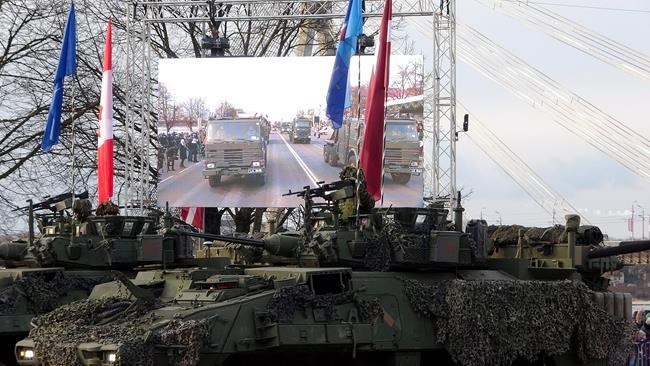RIGA, Latvia — A parade through the streets of Riga Friday in which Canadian soldiers helped mark Latvian independence took on added significance as neighbouring Russia continues its war on Ukraine.
Latvia, a small Baltic nation sharing a long border with Russia, has frequently lived under occupation throughout its history and fears an invasion from its powerful and unpredictable neighbour.
Canada has sent 1,000 soldiers to the country, creating with its NATO allies a defence and dissuasion force based at Camp Adazi, outside the capital.
Lt.-Col. Jérémie Gauvreau, deputy commander of Task Force Latvia, told The Canadian Press that Canada is playing "an essential role" in Latvia.
A group of Canadian soldiers took part in the long procession that marched ahead of Latvian President Egils Levits and other dignitaries on a boulevard alongside the Daugava River in the heart of Riga. Flag-bearers from other NATO allies also took part, as did Ukrainians.
An arsenal was also on display for the large crowd that turned out on a cold, clear day, seemingly happy to be able to attend the parade after two years in which gatherings were restricted because of the COVID-19 pandemic. Latvia and NATO sought to demonstrate their military might, parading self-propelled howitzers, tanks, armoured personnel carriers and trucks, as U.S. jets and helicopters flew overhead.
“It's a neighbouring country that does not want to return to the Soviet era and fears a Russian invasion," Gauvreau explained. "Latvians have been warning NATO for several years that Russia is very aggressive.”
Latvians have twice had to free themselves and win their independence from the Russians.
The first time, exactly 104 years ago on Nov. 18, 1918, they created a republic after the fall of the Russian Empire and the Bolshevik Revolution. But the Soviet dictator Josef Stalin annexed them by force in 1939. Then in 1991, during the disintegration of the U.S.S.R., the Latvians again declared independence.
Janis Garisons, state secretary in Latvia's Ministry of Defence, said the history of Russian domination is a painful memory for Latvians. They remain determined not to give an inch to the Russians, he said in an interview Friday.
An invasion of Latvia could trigger a general conflagration, Gauvreau noted, as under the North Atlantic Treaty, an attack against one NATO member is considered an attack against all members.
"There is always a risk in the region," said Gauvreau, who is originally from Jonquière, Que. "We don't know what goes on in (Russian President Vladimir) Putin's head."
In addition to taking part in the parade, he marked the solemn day by laying a bouquet of flowers at the foot of Riga's Freedom Monument and attending a religious service at Riga Cathedral, which was also attended by the country's president.
"We are representing our flag and integration with Latvians on this day of Latvia's freedom," he concluded.
This report by The Canadian Press was first published Nov. 18, 2022.
— Patrice Bergeron is a Quebec-based journalist with The Canadian Press. In addition to two decades of political and general news experience, he was a CP war correspondent in Afghanistan in 2009.
Patrice Bergeron, The Canadian Press




